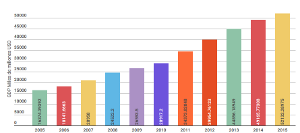I’ve been at the United Nations this week for both the 14th Session of the Committee of Experts on International Cooperation in Tax Matters as well as the Special Meeting of ECOSOC on International Cooperation in Tax Matters.


As you might suspect, it would be an understatement to say this puts me in the belly of the beast (for the second time!). Sort of a modern-day version of Daniel in the Lion’s Den.
These meetings are comprised of tax collectors from various nations, along with U.N. officials who – like their tax-free counterparts at other international bureaucracies – don’t have to comply with the tax laws of those countries.
In other words, there’s nobody on the side of taxpayers and the private sector (I’m merely an observer representing “civil society”).
I could share with you the details of the discussion, but 99 percent of the discussion was boring and arcane. So instead I’ll touch on two big-picture observations.
What the United Nations gets wrong: The bureaucracy assumes that higher taxes are a recipe for economic growth and development.


I’m not joking. I wrote last year about how many of the international bureaucracies are blindly asserting that higher taxes are pro-growth because government supposedly will productively “invest” any additional revenue. And this reflexive agitation for higher fiscal burdens has been very prevalent this week in New York City. It’s unclear whether participants actually believe their own rhetoric. I’ve shared with some of the folks the empirical data showing the western world became rich in the 1800s when fiscal burdens were very modest. But I’m not expecting any miraculous breakthroughs in economic understanding.
What the United Nations fails to get right: The bureaucracy does not appreciate that low rates are the best way of boosting tax compliance.


Most of the discussions focused on how tax laws, tax treaties, and tax agreements can and should be altered to extract more money from the business community. Participants occasionally groused about tax evasion, but the real focus was on ways to curtail tax avoidance. This is noteworthy because it confirms my point that the anti-tax competition work of international bureaucracies is guided by a desire to collect more revenue rather than to improve enforcement of existing law. But I raise this issue because of a sin of omission. At no point did any of the participants acknowledge that there’s a wealth of empirical evidence showing that low tax rates are the most effective way of encouraging tax compliance.
I realize that these observations are probably not a big shock. So in hopes of saying something worthwhile, I’ll close with a few additional observations
- I had no idea that people could spend so much time discussing the technicalities of taxes on international shipping. I resisted the temptation to puncture my eardrums with an ice pick.
- From the moment it was announced, I warned that the OECD’s project on base erosion and profit shifting (BEPS) was designed to extract more money from the business community. The meeting convinced me that my original fears were – if possible – understated.
- A not-so-subtle undercurrent in the meeting is that governments of rich nations, when there are squabbles over who gets to pillage taxpayers, are perfectly happy to stiff-arm governments from poor nations.
- The representative from the U.S. government never expressed any pro-taxpayer or pro-growth sentiments, but he did express some opposition to the notion that profits of multinationals could be divvied up based on the level of GDP in various nations. I hope that meant opposition to “formula apportionment.”
- Much of the discussion revolved around the taxation of multinational companies, but I was still nonetheless surprised that there was no discussion of the U.S. position as a very attractive tax haven.
- The left’s goal (at least for statists from the developing world) is for the United Nations to have greater power over national tax policies, which does put the UN in conflict with the OECD, which wants to turn a multilateral convention into a pseudo-International Tax Organization.
P.S. The good news is that the folks at the United Nations have not threatened to toss me in jail. That means the bureaucrats in New York City are more tolerant of dissent than the folks at the OECD.
Republished from: fee.org

















Add Comment